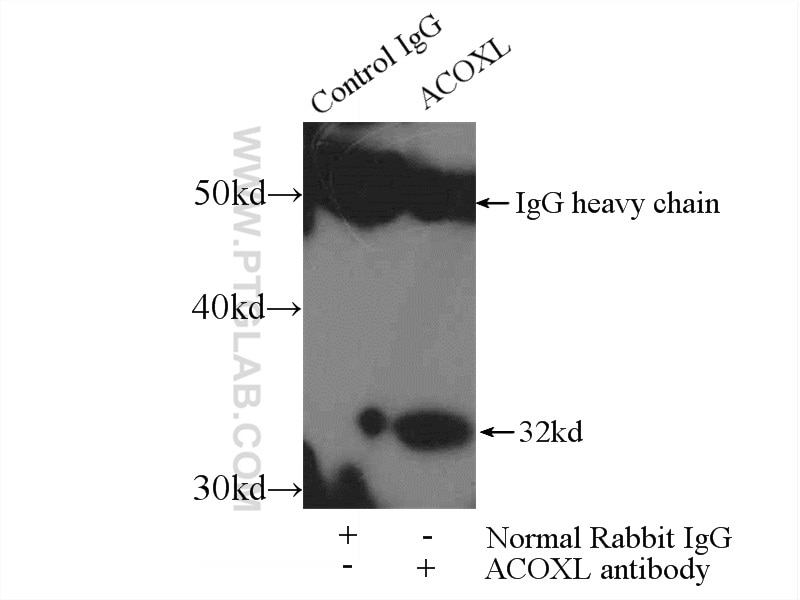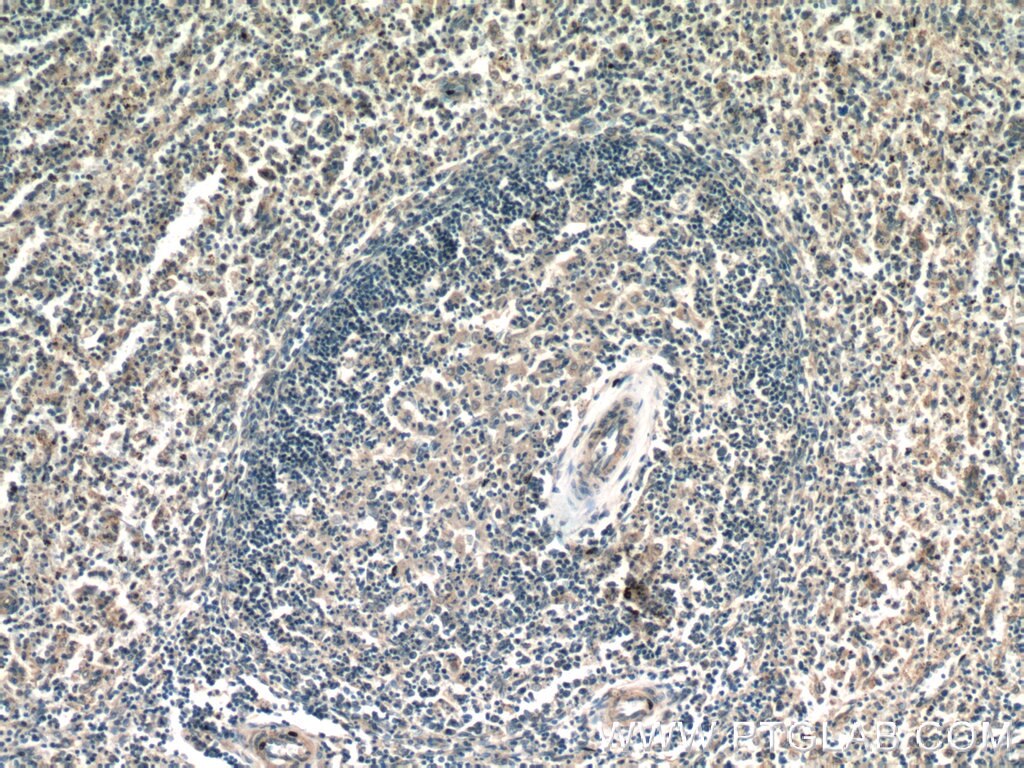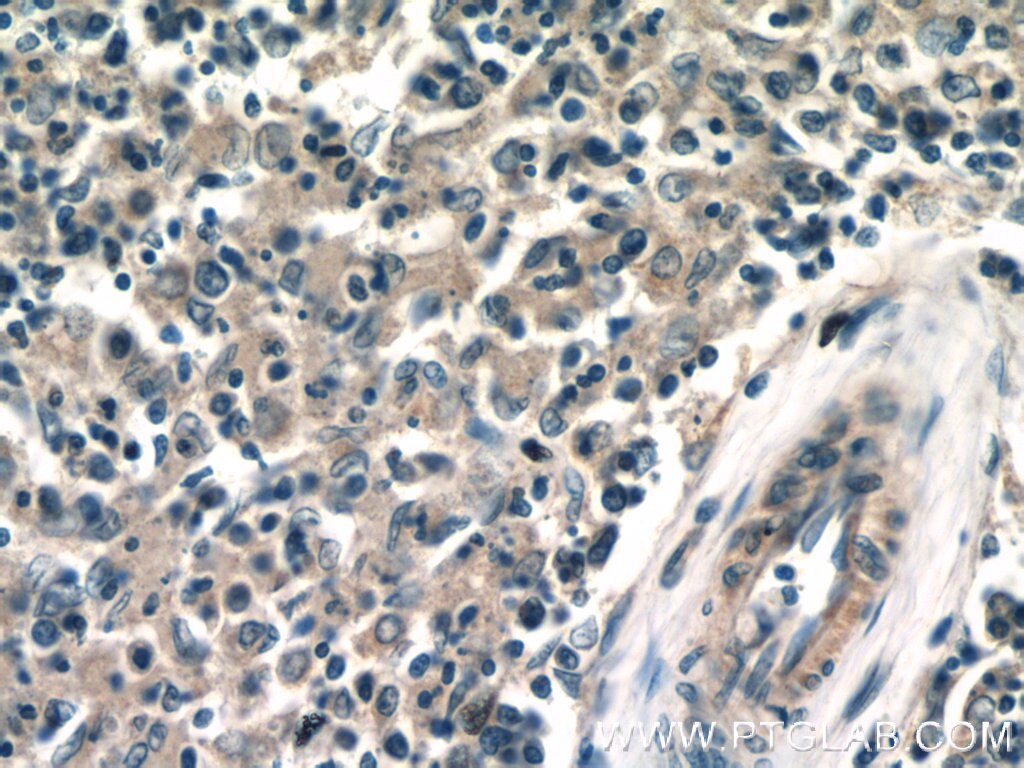Tested Applications
| Positive IP detected in | K-562 cells |
| Positive IHC detected in | human spleen tissue Note: suggested antigen retrieval with TE buffer pH 9.0; (*) Alternatively, antigen retrieval may be performed with citrate buffer pH 6.0 |
Recommended dilution
| Application | Dilution |
|---|---|
| Immunoprecipitation (IP) | IP : 0.5-4.0 ug for 1.0-3.0 mg of total protein lysate |
| Immunohistochemistry (IHC) | IHC : 1:20-1:200 |
| It is recommended that this reagent should be titrated in each testing system to obtain optimal results. | |
| Sample-dependent, Check data in validation data gallery. | |
Published Applications
| WB | See 1 publications below |
| IHC | See 1 publications below |
Product Information
23366-1-AP targets ACOXL in WB, IP, IHC, ELISA applications and shows reactivity with human samples.
| Tested Reactivity | human |
| Cited Reactivity | human, mouse |
| Host / Isotype | Rabbit / IgG |
| Class | Polyclonal |
| Type | Antibody |
| Immunogen |
CatNo: Ag18625 Product name: Recombinant human ACOXL protein Source: e coli.-derived, PET28a Tag: 6*His Domain: 4-355 aa of BC131514 Sequence: NGSLYPGVTAIDMMYKEGLHGVDNGILIFDKVRIPRENLLDKFGSVAPDGQYHSPIRNKSARFNAMLAALTPSRLAVAFQAMGAMKLGLTIAIRYSHSRRQFGPKTKEEVKIIEHQTQTLRLMPHLATALALTFVSRYAGALLDEDVFQGKELVNSRSLQALVAGLKAYSTWENIRCLQDCRECTGGMVVGRELLAQYTKQYEEKPLFGLLQNWAESVGDKLRTSFLAFNMDTVDDLAFLLKAVKFRERVLQRGLVARIYYKVKTKKEDFFHAWNSCLHHVASLSLAHTHRVTLEQFSLAVKSCPDQEDQTLLMKFCLLYGTKLVFQERAWYLEHKYLTPMASTRIRNQERC Predict reactive species |
| Full Name | acyl-Coenzyme A oxidase-like |
| Calculated Molecular Weight | 547 aa, 61 kDa |
| Observed Molecular Weight | 32 kDa |
| GenBank Accession Number | BC131514 |
| Gene Symbol | ACOXL |
| Gene ID (NCBI) | 55289 |
| RRID | AB_2879266 |
| Conjugate | Unconjugated |
| Form | Liquid |
| Purification Method | Antigen affinity purification |
| UNIPROT ID | Q9NUZ1 |
| Storage Buffer | PBS with 0.02% sodium azide and 50% glycerol, pH 7.3. |
| Storage Conditions | Store at -20°C. Stable for one year after shipment. Aliquoting is unnecessary for -20oC storage. 20ul sizes contain 0.1% BSA. |
Protocols
| Product Specific Protocols | |
|---|---|
| IHC protocol for ACOXL antibody 23366-1-AP | Download protocol |
| IP protocol for ACOXL antibody 23366-1-AP | Download protocol |
| Standard Protocols | |
|---|---|
| Click here to view our Standard Protocols |
Publications
| Species | Application | Title |
|---|---|---|
BMC Complement Med Ther Salvia-Nelumbinis naturalis improves lipid metabolism of NAFLD by regulating the SIRT1/AMPK signaling pathway | ||
Front Genet Transcriptome profiles of fatty acid metabolism-related genes and immune infiltrates identify hot tumors for immunotherapy in cutaneous melanoma |








